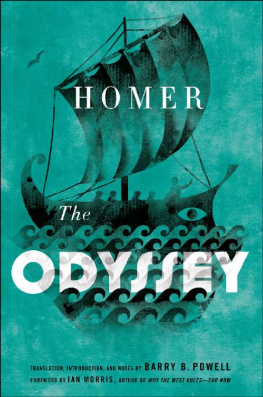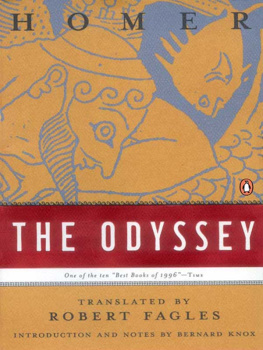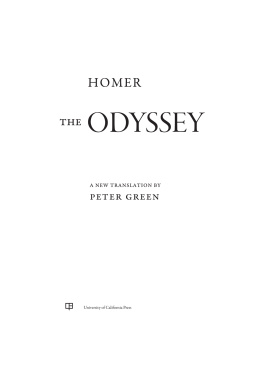Homer - The Odyssey Translated by Barry B. Powell
Here you can read online Homer - The Odyssey Translated by Barry B. Powell full text of the book (entire story) in english for free. Download pdf and epub, get meaning, cover and reviews about this ebook. year: 2014, publisher: Oxford University Press, genre: Art. Description of the work, (preface) as well as reviews are available. Best literature library LitArk.com created for fans of good reading and offers a wide selection of genres:
Romance novel
Science fiction
Adventure
Detective
Science
History
Home and family
Prose
Art
Politics
Computer
Non-fiction
Religion
Business
Children
Humor
Choose a favorite category and find really read worthwhile books. Enjoy immersion in the world of imagination, feel the emotions of the characters or learn something new for yourself, make an fascinating discovery.
The Odyssey Translated by Barry B. Powell: summary, description and annotation
We offer to read an annotation, description, summary or preface (depends on what the author of the book "The Odyssey Translated by Barry B. Powell" wrote himself). If you haven't found the necessary information about the book — write in the comments, we will try to find it.
Homer: author's other books
Who wrote The Odyssey Translated by Barry B. Powell? Find out the surname, the name of the author of the book and a list of all author's works by series.
The Odyssey Translated by Barry B. Powell — read online for free the complete book (whole text) full work
Below is the text of the book, divided by pages. System saving the place of the last page read, allows you to conveniently read the book "The Odyssey Translated by Barry B. Powell" online for free, without having to search again every time where you left off. Put a bookmark, and you can go to the page where you finished reading at any time.
Font size:
Interval:
Bookmark:

THE ODYSSEY


Homer
Translation, Introduction, and Notes
by
Barry B. Powell
Foreword
by
Ian Morris

Oxford University Press is a department of the University of Oxford.
It furthers the Universitys objective of excellence in research,
scholarship, and education by publishing worldwide.
Oxford New York
Auckland Cape Town Dar es Salaam Hong Kong Karachi
Kuala Lumpur Madrid Melbourne Mexico City Nairobi
New Delhi Shanghai Taipei Toronto
With offices in
Argentina Austria Brazil Chile Czech Republic France Greece
Guatemala Hungary Italy Japan Poland Portugal Singapore
South Korea Switzerland Thailand Turkey Ukraine Vietnam
Copyright 2014 by Oxford University Press
Published by Oxford University Press
198 Madison Avenue, New York, New York 10016
http://www.oup.com
Oxford is a registered trademark of Oxford University Press.
All rights reserved. No part of this publication may be reproduced, stored in a retrieval system, or transmitted, in any form or by any means, electronic, mechanical, photocopying, recording, or otherwise, without the prior permission of Oxford University Press.
Library of Congress Cataloging-in-Publication Data
Homer, author.
[Odyssey. English]
The odyssey / Homer ; translation, introduction, and notes by Barry B. Powell. pages cm
Includes bibliographical references and index.
ISBN 978-0-19-936031-4
I. Powell, Barry B. II. Title.
PA4025.A5P69 2014
883.01--dc23
Printing number: 9 8 7 6 5 4 3 2 1
Printed in the United States of America
on acid-free paper
To Sanford Dorbin, who knows a good story when he hears it
T he Odyssey is one of the worlds greatest and best-loved poems. It is an adventure story, a romance, and a tale of coming of age, all rolled into one. For twenty-seven centuries, it has survived through upheavals that have wiped out most of what was written in the ancient world. Dictated by the great (but probably illiterate) poet Homer to scribes writing on papyrus, it has been copied and recopied onto parchment and paper, and in the last generation or two adapted for radio, the cinema, video games, and the Internet. It has inspired painters, poets, sculptors, and screenwriters, and now Barry Powell, one of the twenty-first centurys leading Homeric scholars, has given us a powerful new translation.
Strange as it may seem, although the Odyssey is one of the most famous poems ever written, we know almost nothing about its author. In the nineteenth century, some classical scholars even suggested that Homer had never existed at all; the poem, they argued, was the creation of an editorial committee that stitched together shreds and patches of verse composed across several centuries by wandering minstrels whose names are now lost. After reading this translation, though, you will see why this has mostly been a minority view. The Odysseys unity of theme, form, and language speaks clearly of a single creative genius (whom ancient writers always called Homer) who probably also composed the Iliad, the other great cultural achievement of early Greece.
Homer probably lived in the eighth century BC, in the very years that the Greeks adapted a writing system used in Phoenicia (roughly the same area as modern Lebanon) to create the script from which all modern alphabets descend. Writing had been around for a very long time by this point, going back all the way to 3300 BC in what we now call Iraq, butas Barry Powell has forcefully argued in a series of books and essays across the last twenty-five yearsthis new Greek script was revolutionary.
Most writing systems began their lives in the hands of accountants, who used various scripts to keep business and bureaucratic records. Only graduallyusually across several centuries or even millenniadid the scripts acquire the flexibility needed to record literature. The Greek alphabet, by contrast, seems to have been linked to literature from its earliest days. Whoever designed the Greek alphabet set aside certain signs to represents vowels. Hardly any other scripts did this, because separate signs for vowels were not really necessary for bookkeeping, but for recording the sounds and quantities of poetry, they were invaluable.
This seems not to have been an accident. Greek is unique among ancient scripts in that most surviving examples from the first century of its use (between roughly 750 and 650 BC) are fragments of poetry, not managers tallies. It is hard to avoid the conclusion that Greeks created their alphabet in the eighth century primarily to write down poetryor even, as Professor Powell proposed in his path-breaking book Homer and the Origin of the Greek Alphabetthat they created it specifically to write down Homers poetry.
Homer seems to have been the greatest of the oral poets of eighth-century Greece, composing epics as he performed, much in the way that modern jazz, blues, and rock guitarists or rap singers compose their music as they perform. Around 800 BC, some geniusPowell calls him the Adapterdecided to modify the writing system in use at the time in Phoenicia, changing five signs to represent vowels so as to make it better suited to capture the subtleties of poetry. In recording sessions that must have gone on for months, the Adapter had Homer dictate his inspired poetry, and he used the new alphabetic technology to immortalize first the Iliad and then the Odyssey.
These extraordinary events were only possible because Homer and the Adapter lived in an era of expansion. Around 850 BC, roughly fifty years before the Odyssey was written down, the worlds climate had begun to change. Geologists speak of a shift from the Sub-Boreal to the Sub-Atlantic periodwhat this meant for the people of the Mediterranean basin was that winter winds, which carried rain in from the Atlantic Ocean, now began blowing more strongly. The biggest problem facing farmers in the ancient Mediterranean had always been that rainfall was low and unreliable, and so this shift toward a cooler, wetter climate was a great benefit. In the eighth century BC, populations were growing rapidly everywhere from Persia to Portugal.
The number of people in Greece may have doubled during the eighth century, with dramatic consequences. There was more fighting, of the kind we see in both the Iliad and the Odyssey, as towns squabbled over land and raiders stole what they could. More effective governments took shape to resolve leadership meltdowns of the kind we see on Ithaca at the beginning of the Odyssey. Hungry Greeks began trading farther and farther afield, having the kind of adventures that fill the pages of this book. Plunging into the unknown waters of the west Mediterranean, they imagined that the caves were filled with monsters like Polyphemos and the islands inhabited by wonder women such as Kirk. Trade brought Greeks into the east Mediterranean Sea and Phoenicians into the Aegean Sea, and in one (or both) of these settings Greeks learned about the Phoenician script, which, thanks to the Adapter, ultimately made our texts of the
Next pageFont size:
Interval:
Bookmark:
Similar books «The Odyssey Translated by Barry B. Powell»
Look at similar books to The Odyssey Translated by Barry B. Powell. We have selected literature similar in name and meaning in the hope of providing readers with more options to find new, interesting, not yet read works.
Discussion, reviews of the book The Odyssey Translated by Barry B. Powell and just readers' own opinions. Leave your comments, write what you think about the work, its meaning or the main characters. Specify what exactly you liked and what you didn't like, and why you think so.














